If we're going to optimize for Google, we need to know how Google works.
Searching for the best dog treat
Here's what happens when you search:
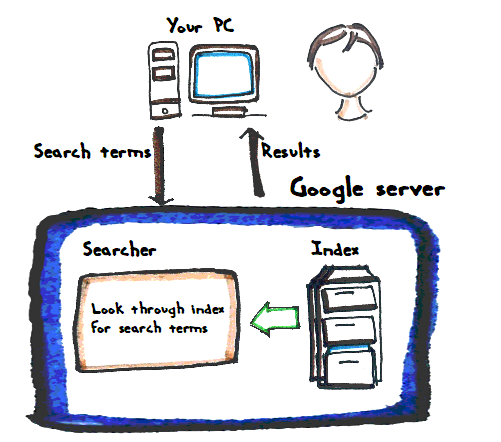
You type in some search terms, like "best dog treat." Your browser sends the terms to a Google server. It runs a program we'll call the searcher. It looks in the index, a humongous database of content from the web. The index has entry for billions of pages. Each index entry has the page's keywords, the page's language, the URLs of pages that link to the page, and more. The searcher works out a score for the pages, based on how useful it thinks the page would be to you.
The searcher takes the entries with the highest scores, makes a list of them, and sends the list back to your browser.
The index

Adela
Where does the index come from?
Ooo, good question! The index is created by another program, we'll call the spider.
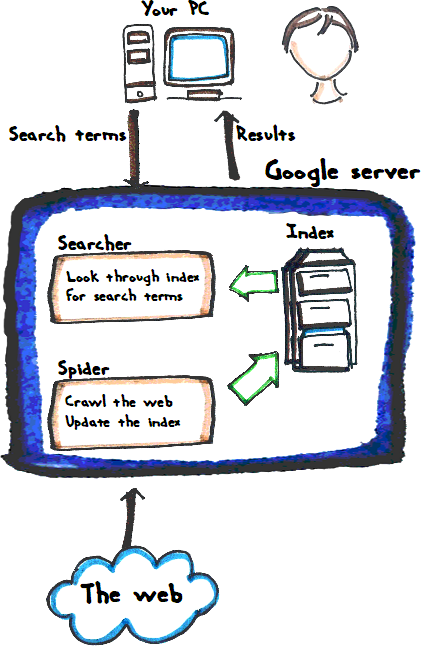
The spider grabs a webpage, analyzes it, and adds it to the index. Then the spider finds the links on the page (by searching for a tags), and jumps to those pages. It grabs them, analyzes them, and adds them to the index, and follows their links to other pages. Repeat. Forever.
"Analyze a page" means the spider finds the page's keywords, language, links to the page, and other data that's stored in the index. That data is used later, when people run searches.
Your site
Your website is one of millions the spider grabs, processes, and adds to the index.
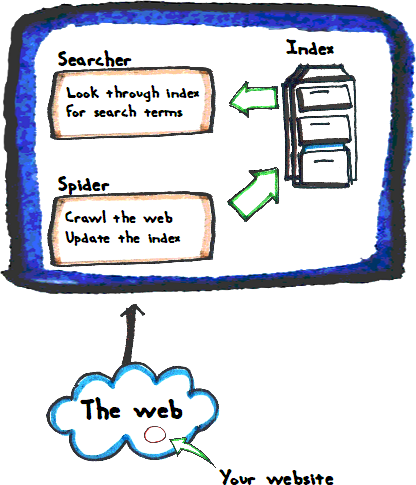
Our job is to set up pages so that, when the spider finds them, it analyzes them in the way we want. That is, in a way that will give high search scores for certain keywords.
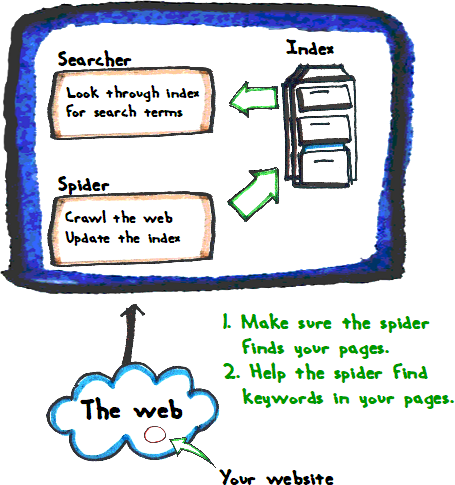
Remember, the searcher uses the index created by the spider. We want the spider to make index entries that look good to the searcher, when someone searches for "best dog treat."
How does Google rank pages?
So, Google lists pages for a search. How does it decide what pages, and in what order?
Try this search: best dog treat
For me, the first listings were paid ads.
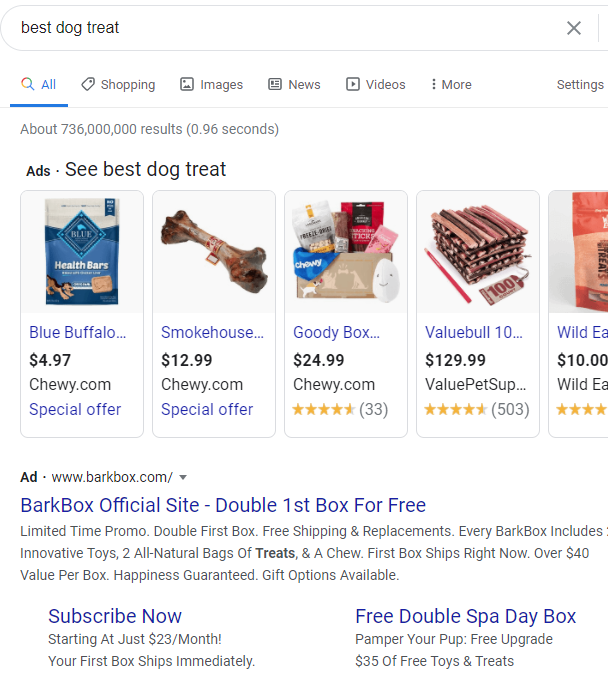
Makes sense. That's how Google makes its money. Companies pay Google when someone clicks on one of their links.

Marcus
How much do they pay?
It depends on the keyword. Anywhere from a few cents, to a couple of hundred dollars. You can read more about that.
Further down, there are entries for pages that are not paid.
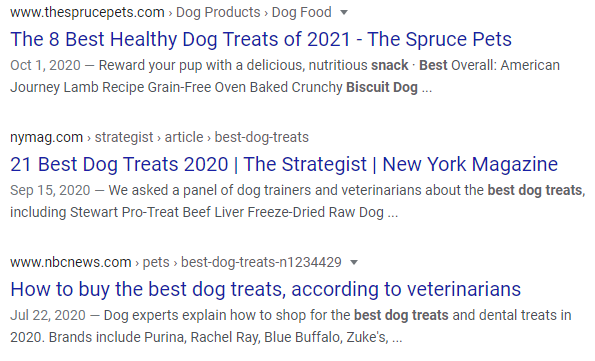
These are the organic results. We're interested in ranking here.
Google's criteria and weights
So, what factors determine a page's score? Google won't give us the exact algorithm, but they do offer advice. Factors include:
- Keyword match
- Number of links to the page. Each link is a vote for the page.
- Loading speed. Fast is good.
- Security. https is better than http.
Google's business model
You might have noticed that Google is a successful company.

Adela
Yeah, I think everyone has noticed that.
Why are they so successful?

Ray
They sell a lot of advertising, among other things.
Right! Why do companies want to buy advertising from Google?

Georgina
So many people use Google, if you advertise with them, people are going to see your ads.
Aye! Now, the big question: Why do so many people use Google?
(Silence. That happens in class. A lot.)

Ray
Well... for me, Google is useful. It gives me info I want. Like, I use it as a calculator.
For example, if you type...
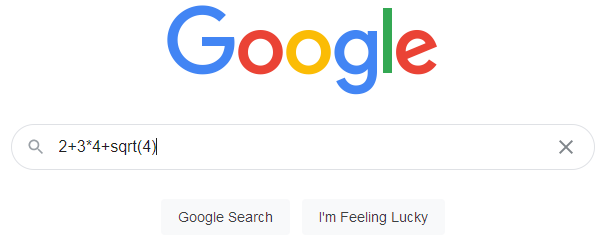
... you get...
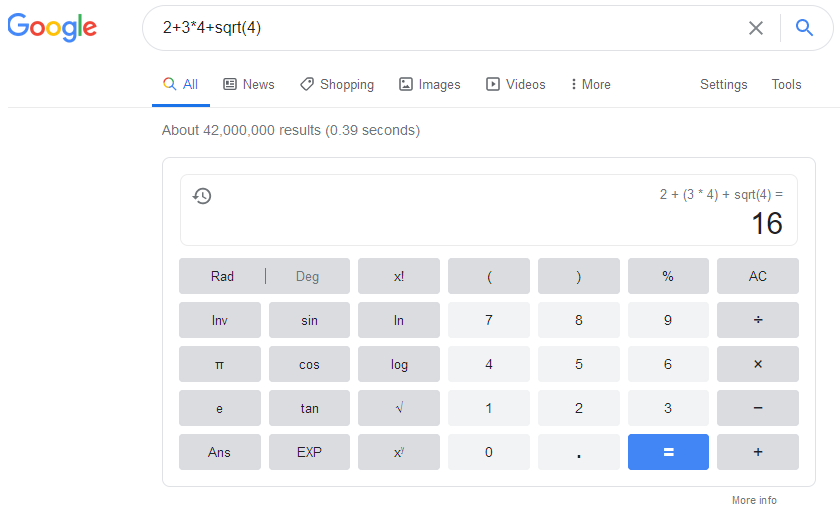

Adela
Wow, I didn't know that.
But, Ray isn't buying anything, when he types in a formula. Why would Google make a calculator?

Ray
Oh, I see where you're going with this. I think. Maybe.
The more useful Google is to people, the more they'll use it, for many different things. If Google always gives you what you want, you just go there automatically. For formulas, buying jewelry, whatevs.
Indeed! That's the key to organic SEO:
- Make your pages useful.
- Let the spider know what searches each page will be most useful for.

Ray
What's that second one?
Say you're making a history site, about Germany in World War II. You write a page about the Beer Hall Putsch, in 1923. Hitler and a couple thousand pals marched on the center of Munich, where they battled police. Hitler was arrested, and sentenced to five years in prison. He was released after nine months (wasn't that a good move). While in prison, Hitler decided to gain power through legal means. He was elected chancellor (equivalent to the president in the US) ten years later.
OK, so who is your page most useful to?

Adela
To people who want to know about the Beer Hall Putsch.

Georgina
Oh! So you tell the spider that's what the page is about. The spider will list the page that way in the index. When someone searches for "beer hall putsch," the searcher will find your page, because of how the spider listed it.
Exactly! Some of the SEO methods we'll talk about are helping the spider work out what the page is about.
A good rule of thumb: the more useful a page is, the higher it will rank in Google.
Summary
- There's a searcher, a spider, and an index.
- Spiders follow links, grab pages, analyze them, and put the data into the index.
- We know some of the criteria Googles uses in their ranking, such as keyword match, the number of links to a page, loading speed, and security.
- The more useful a page is, the higher it will rank in Google.
Up next
Let's talk about different tasks SEO people do to increase ranking.